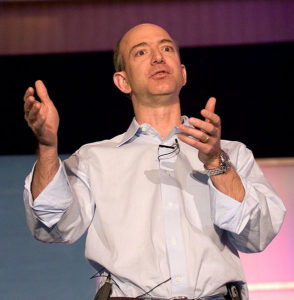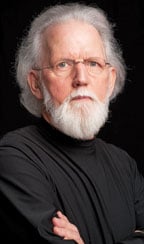North Carolina Business Council hosts panel that advocates investing in growing local business

Put their sentiments into song lyrics and the trio of panelists who discussed the impact of Amazon’s HQ2 would be singing in perfect harmony: “We don’t want it, you can have it, it’s not good for the Tar Heel State.”
Their focus was on what would befall the region should finalist Raleigh, North Carolina, be the pick of the 20-city litter to land the deal.
The nearly two-hour discussion March 14 took place at Elon University, a private institution with a student body of 6,000, both undergraduate and graduate, who study in a half-dozen fields including business, health sciences and law.
Since Austin is also among the 20 finalists trying to reel in what Amazon claims to be a $5 billion investment and 50,000 jobs averaging $100,000 in annual pay, The Austin Bulldog tuned in to cover the webcast.

The three panelists were Chelsea Glen Dickey, director of community development for The CoOperative in Graham, a city of fewer than 15,000 people located 54 miles northwest of Raleigh; Brent Lane, a strategist with the Kenan Institute of Private Enterprise who advises North Carolina lawmakers on economic policies; and Michael H. Shuman, an attorney, economist, and expert on community economics.
The event was organized by the North Carolina Business Council and moderated by Brandon Sheridan, an assistant professor of economics at Elon U.
Putting the Amazon opportunity in context

Viewing the prospect of Amazon’s promised jobs from North Carolina’s perspective, Lane said, those 50,000 jobs represent just 1 percent of new job growth in the state, which has the “twenty-second largest economy in the world.”
Addressing a live audience consisting mainly of students, Lane said the challenge at the state level is on paying incentives for a company to come to North Carolina “that pretends it will go somewhere else if we don’t.” He said such legislative decisions are made based on whether a project would produce “a net positive on the state budget.”
“It’s perfectly right to ask how do these decisions benefit you, not whether it increases the economy by some abstract measure,” he said.
“They should put less emphasis on incentives and more focus on quality of life, education, and sound policies that make life better for us. That’s my challenge to the (North Carolina) Business Council: provide the political cover to deemphasize economic incentives.”
“I counsel legislators about incentives,” he said. “Is was it worth it? You’ll never know. Companies hold the cards.”
Incentives driven by politics, not economics
Almost inevitably, “The legislature will do the wrong thing—not for economic reasons but for political reasons.”
Lane said the way the Amazon competition is being conducted, “it’s political theater to expose ridiculous competition” and watch communities “beggar themselves.”
What makes Raleigh good for business is the quality of its workforce, its schools, and its human capital. “Raleigh can’t be a good fit for this,” he said.
Lane said the benefit of lowering taxes for existing businesses by an amount equivalent to what may be offered to Amazon would be a far better choice for the economy.
He pointed to The Brooking Institute’s study of 2014, Declining Business Dynamism in the United States: A look at states and metros, that shows a steady rate of decline in creation of new businesses. “It’s terrifying,” he said. “We are no longer creating new businesses faster than they are dying. … As an economy we need to be very concerned about the slowing pace of entrepreneurship.”
Lane, who started his career as an anthropologist, said, “Amazon will be a cultural bomb, a gentrification bomb. You will be displacing a lot of your indigenous population.
“Is your duty to your current residents or to future residents who may come here?”
Lane said that the scoring system for evaluating corporate recruiting opportunities must include housing and transportation. “Right now it’s not part of the model the state uses to evaluate economic impact.”
He said the case against offering incentives is economic.
“You have to be knowledgeable about what your goals are and become proactive—Amazon is reactive.”
A main street perspective

Dickey said she was “passionate about local place-making” and declared there are “cool mom-and-pop businesses all over the state.”
Her job includes helping them get financial capital and fulfilling Alamance County’s dream of wanting businesses to stay. “If we can help main street downtown, they will hang around longer,” she said.
In looking at the possibility of Amazon coming to the region, she examined how it affected Seattle, it’s home base. “They haven’t preserved community in Seattle. They had a huge impact on affordability.”
Although Dickey noted that some local companies “have used Amazon as a springboard” by selling their wares through the Internet retailer, “some feel like it’s direct competition.”
She said she used to live in Seattle and observed the company’s effects firsthand. “It caused a change in the local economy from the ground up. If Amazon comes here, I don’t think it will sustain a lot of our main street businesses and a new economy will come out of that.”
Winning is losing

Shuman was blunt from the beginning: “Whoever wins will be the biggest loser in economic development in history,” he said.
“There is something unsavory,” he said, about the nation’s Number One retailer, owned by the richest man in the world, being given money that’s taken away from school children for books.
By Shuman’s reckoning the winner will be willing to pay $100,000 to $200,000 per job to attract HQ2. If so, by the Bulldog’s calculation, those 50,000 jobs equate to $5 billion to $10 billion in incentives.
“What else could you do with that money if it were spent on local businesses?” Shuman said.
Incentive offers roll the dice
By way of bad example he citied the circus community of Sarasota, Florida, that was willing to put out $137 million in incentives and ended up with nothing to show for it. They were trying to attract the Danish company Xellia Pharmaceuticals that reportedly would spend $120 million to open a U.S. plant and hire 191 full-time employees at an average of pay of $70,000.
That comes to an offer of more than $717,000 in incentives for each job and an annual payroll of just $13.4 million.
“Guess who won the Xellia competition?” Shuman said. “You, right here, you won,” noting that the company landed in Raleigh, where it has based its U.S. headquarters.
Another North Carolina example: In 2004 Round Rock-based Dell Inc. netted more than $279 million in state and local incentives and promised 1,500 jobs and a $100 million investment over five years. That’s $186,000 per job. Dell picked a site in Forsyth county. A lawsuit challenging the incentives failed. Four years after opening the new manufacturing plant to build desktop computers, Dell closed it, laying off 905 workers, according to WRAL.com.
Former Supreme Court Justice Robert Orr of the North Carolina institute for Constitutional Law, which had filed the lawsuit over incentives, said the plant’s closing “highlights the incentives game” that North Carolina and local governments play to attract industry.
“Secrecy is the enemy of intelligent economic development,” Shuman said. “Yet so much of it is done entirely in secret.”
Impact of 50,000 more people
Shuman asked, what happens with 50,000 people put more cars on the roads, when you have to build infrastructure, when schools are crowded with their children, when housing prices and rent prices skyrocket, and homelessness goes up?
“All these things happened in Seattle as result of HQ1,” he said.
Shuman cites Richard Florida, an urban studies theorist and author of a series of books on the creative class, who argues we need to be concerned about the equality impacts of economic development.
“There is a lot of evidence that incentive competition leads to greater inequality,” Shuman said. School budgets have to be cut. The poor no longer have a place to live. Local businesses are hurt. That kind of growth subsidizes global businesses that hurt local business.
“Finally, there are the taxpayers that foot the bill for Jeff Bezos.”
Better alternative is to grow local business
Shuman said that “60 percent to 80 percent” of the economy is driven by locally owned businesses. Not only are they untouched by incentives but “they are hurt by them.”
Among the reasons locally owned businesses are the key to local prosperity, he said, is that they spend more locally. “Dozens of studies over the past 15 years have shown that locally owned businesses create two and a half times the economic impact of non-local businesses.”
One of the first such studies was conducted right here in Austin in 2002. That study by Civic Economics compared the local economic impact of spending $100 at a chain store vs. spending the same amount at locally owned retailers. Key finding: “The same amount spent with a local merchant yields more than three times the local economic impact.”
The Executive Summary of that Economic Impact Analysis, which was paid for by the Austin Independent Business Alliance and Liveable City, is linked below. (Disclosure: My wife of 30 years, Rebecca Melançon, is executive director of the AIBA.) To access some of the other local business studies, click here.
Pollinators grow businesses locally
Shuman, an advocate of a concept he calls business pollinators, cited numerous examples of local economic success. This is a concept he addressed at length in his book, The Local Economy Solution: How Innovative, Self-Financing Pollinator Enterprises Can Grow Jobs and Prosperity.
One example he offered was Zingerman’s Delicatessen in Ann Arbor, Michigan. Successful in the 1980s, Zingerman’s had the opportunity to grow nationally but instead focused on growing locally. It created its own coffee roaster, its own bakehouse, its own sit-down restaurant. It even makes candy bars. Zingerman’s now owns a dozen independent businesses that produce more than $60 million in annual income and employs 650 people, Shuman said. It even teaches other businesses how to follow its path to success with ZingTrain Seminars, in essence playing the role of an entrepreneurship pollinator
He cited another pollinator that’s headquarters is located in Amazon’s backyard in Seattle, as well as Peru and Spain, called Fledge. Founded by Michael “Luni” Lebes, Fledge incubates businesses and takes a fee in the form of a 5 percent stake that the businesses can buy back after graduation.
Shuman also touts the success of Hatch Oregon, where companies in that state can “invest in themselves through ‘crowdvesting.’ ” Its mission is to raise capital, invest in Oregon, and build the business ecosystem.
“That’s what we want to encourage,” he said. “Grow the supply chain locally and market locally.”
“The bottom line on all of this is you’ve got to focus on economics and public policy, and make hard choices,” Shuman said. “If you waste a dollar on trying to get an outside attraction then you’re not putting it into local businesses that are better generators” of local economic success.
“We have to think carefully how we target resources to get the maximum impact,” Shuman said.”
“Whatever community wins this competition,” he said, “I would urge they follow Nancy Reagan’s injunction and ‘Just say no.’ ”
Related Bulldog coverage:
Amazon Bid Made Without Council Okay: Claim city’s contract with Chamber permits bid on City’s behalf is questionable, February 27, 2018
Links:
Agreement by and between the Greater Austin Economic Development Corporation and the City of Austin for Participating in the Opportunity Austin Campaign, executed by the City of Austin July 30, 2015. (70 pages)
Amazon HQ2 Request for Proposals (undated, 8 pages)
City Council Questions and Answers for Thursday, December 11, 2014 (35 pages)
Mayor Steve Adler’s letter to Amazon (undated, 2 pages)
Nondisclosure Agreements signed by City of Austin managers (2 pages)
Ordinance No. 20091001-011 Adding an Enhanced Process for Review of Economic Incentive Proposals (2 pages)
Recommendation for Council Action, Agenda Item 25, Meeting Date 12/11/14
Regular Council Minutes, Thursday, December 11, 2014 (see Item 25) (53 pages)
Levity: The Amazon headquarters search mystery has been solved! Or has it? The Washington Post, February 26, 2018
Trust indicators:
 Ken Martin has been covering local government and politics in the Austin area since 1981. See more on Ken on the About page. Email [email protected].
Ken Martin has been covering local government and politics in the Austin area since 1981. See more on Ken on the About page. Email [email protected].
Who funds this work? This report was made possible by contributions to The Austin Bulldog, which operates as a 501(c)(3) nonprofit for investigative reporting in the public interest. You can help support this independent coverage by making a tax-deductible contribution.
An alphabetic list of donors who have contributed to The Austin Bulldog since the organization was formed in 2009 and the cumulative amount each person has given through October 30, 2017, are listed on the Contribute page.
Comments are welcome: If you would like to post your reaction to this story, please do so on the Bulldog’s Facebook page.







